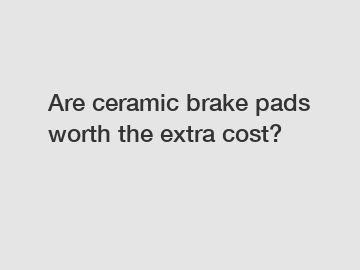Are ceramic brake pads worth the extra cost?
Are Ceramic Brake Pads Worth the Extra Cost?
When it comes to brake pads for your vehicle, there are numerous options available in the market. One of the most popular choices among car enthusiasts and professionals is ceramic brake pads. These pads are known for their superior performance and durability, but are they worth the extra cost? In this blog post, we will delve into the benefits of ceramic brake pads and discuss if they're worth the investment.
Ceramic brake pads are made from a combination of ceramic fibers, non-ferrous materials, and bonding agents. These materials are compressed and subjected to high heat, creating a dense and smooth compound that offers exceptional braking power. This unique composition sets ceramic brake pads apart from their traditional counterparts, providing several advantages that justify their higher price point.

First and foremost, ceramic brake pads are renowned for their superior stopping power. Thanks to their stronger bite and improved friction characteristics, these pads offer shorter stopping distances compared to organic or semi-metallic alternatives. Whether you're driving on city streets or tackling challenging terrains, ceramic brake pads enhance your vehicle's braking performance, ensuring increased safety for you and your passengers. This enhanced stopping power is especially noticeable in emergency situations where every inch matters.
Another significant advantage of ceramic brake pads is their exceptional durability. Ceramic pads exhibit excellent resistance to heat, friction wear, and brake fade. Brake fade occurs when brakes overheat and lose their effectiveness, jeopardizing your ability to slow down or stop when needed. With ceramic brake pads, the risk of brake fade is significantly reduced, making them the ideal choice for those who frequently encounter demanding driving conditions or engage in high-performance driving.
Not only do ceramic brake pads offer robust performance, but they also contribute to a quieter and smoother ride. Traditional brake pads often produce annoying squeaks, squeals, or grinding noises, which can disturb both the driver and passengers. Ceramic brake pads, on the other hand, operate more silently due to their composition and reduce the amount of noise generated during braking. This feature ensures a more serene driving experience, allowing you to focus on the road ahead without unnecessary distractions.
Furthermore, ceramic brake pads are cleaner in operation. Unlike their counterparts, ceramic pads produce minimal dust when braking. Dust residue that accumulates on your wheels can be unsightly and challenging to clean, diminishing your vehicle's overall appearance. With ceramic brake pads, you can bid farewell to dusty wheels and spend less time cleaning and maintaining the aesthetic appeal of your car.
It's important to note that while ceramic brake pads offer numerous advantages, they may not be the best choice for everyone. The higher cost of ceramic pads can be a deterrent for those on a tight budget. If you primarily drive in normal conditions and don't frequently encounter challenging terrains or engage in high-performance driving, organic or semi-metallic brake pads may suffice.
In conclusion, ceramic brake pads undeniably provide an array of benefits that justify their extra cost. With superior stopping power, enhanced durability, reduced noise, and cleaner operation, they are an excellent choice for drivers seeking top-notch braking performance and a more enjoyable driving experience. However, it's essential to weigh these advantages against your driving needs and budget constraints to determine if ceramic brake pads are the right investment for you.
Want more information on Wholesale Audi Oem Brake Pads, 22737859 Auto Brake Pads, Rear Axle low-metallic brake pad? Feel free to contact us.


